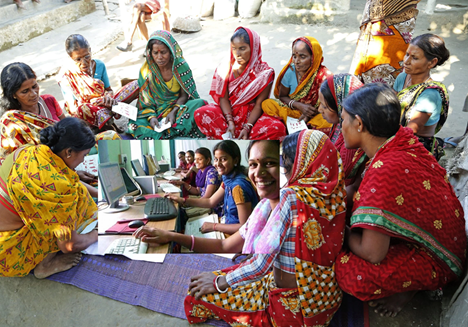In the heartlands of Andhra Pradesh, where the verdant fields stretch to meet the horizon, a quiet revolution is underway. It’s not led by politicians or businessmen but by the very backbone of rural India: its women.
Empowering rural women has become a focal point in the state’s development agenda, with initiatives aimed at fostering socio-economic progress and gender equality. In this article, we delve into the transformative efforts underway, blending policy insights with personal narratives that illuminate the journey of these resilient women.
Andhra Pradesh, with its diverse landscape ranging from fertile plains to arid regions, presents unique challenges and opportunities. Historically, rural women have been relegated to the sidelines, confined to traditional roles within the household. However, winds of change are sweeping across the villages, propelled by grassroots movements and government interventions.
One such initiative making waves is the establishment of Self-Help Groups (SHGs). These groups, comprising women from similar socio-economic backgrounds, serve as platforms for collective action and mutual support. I had the privilege of witnessing the impact firsthand during a visit to a remote village nestled amidst the Eastern Ghats.
As I sat with the members of a local SHG under the shade of a neem tree, their stories unfolded like petals unfurling at dawn. Rani, a spirited woman in her forties, recounted how joining the SHG had been a turning point in her life. “Earlier, I had no say in financial matters. But now, with the support of my group, I run a small tailoring business from home. I contribute to my family’s income and have gained newfound confidence.”
The SHGs not only provide access to credit but also impart training in financial literacy and entrepreneurship. This holistic approach empowers women with the skills and knowledge needed to break free from the shackles of poverty. Moreover, the camaraderie within these groups fosters a sense of solidarity, eroding age-old barriers of caste and creed.
Another beacon of hope is the Mahila Samakhya program, aimed at enhancing the status of women through education and awareness. Through innovative initiatives such as mobile libraries and community learning centers, women are being equipped with the tools to navigate the complexities of the modern world. From basic literacy to vocational training, these programs open doors to a realm of possibilities previously deemed unattainable.
I vividly recall my interaction with Sarala, a young girl whose thirst for knowledge mirrored the aspirations of an entire generation. “I never thought I could pursue my studies beyond high school,” she confided, her eyes shimmering with determination. “But thanks to Mahila Samakhya, I am now preparing for college entrance exams. Education is my ticket to a brighter future.”
Education not only empowers women to chart their own destiny but also serves as a catalyst for social change. By challenging ingrained stereotypes and fostering critical thinking, educated women become agents of transformation within their communities. This ripple effect is palpable, as attitudes towards gender roles undergo a gradual but profound shift.
In addition to education and entrepreneurship, access to healthcare remains a cornerstone of women’s empowerment. The Aarogya Raksha scheme, launched by the state government, aims to provide comprehensive health coverage to rural households. Through a network of primary health centers and mobile clinics, women are receiving much-needed medical attention, thereby safeguarding their well-being and that of their families.
I recall the poignant tale of Lakshmi, a mother of three grappling with the burden of illness and poverty. “Before Aarogya Raksha, I would hesitate to seek medical help due to the prohibitive costs,” she recounted, her voice tinged with gratitude. “But now, with access to free healthcare services, I can breathe a sigh of relief. My children are healthier, and I can focus on building a better future for them.”
As I reflect on the myriad initiatives driving change in rural Andhra Pradesh, one underlying theme emerges: the resilience of its women. Despite facing myriad challenges, they refuse to be mere spectators in the theater of life. Instead, they seize the reins of destiny, steering their communities towards a brighter tomorrow.
However, the journey towards empowerment is fraught with obstacles, chief among them being gender-based violence and discrimination. While policy interventions lay the groundwork for change, grassroots activism and community engagement are equally crucial. By fostering a culture of respect and equality, we can create an environment where every woman can thrive and fulfill her potential.
In conclusion, the empowerment of rural women is not just a moral imperative but a strategic imperative for socio-economic progress. By investing in their education, health, and economic well-being, we sow the seeds of a more inclusive and prosperous society. As the sun sets on the horizon, casting a golden glow over the tranquil villages of Andhra Pradesh, let us pledge to walk hand in hand with its women, forging a path towards a future where gender equality reigns supreme.#hydkhabar

